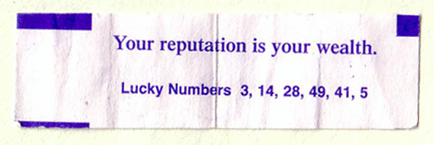
Over cold jasmine tea and quartered oranges in Chinatown, I got this little gem of a fortune. I chuckled at its relevance to our work at the institute. With the rise of self publishing (blogs, wikis, and POD), being google searchable, and content being freely given away, I wonder what our readers think about reputations being our wealth. Is this truth, nothing new, tom foolery, or just a fad? Has the concept of “reputation” changed? Have you and your work felt an effect as well? If so, how? I’m looking forward to hearing your thoughts.
if:book
A Project of the Institute for the Future of the Book

I am not sure about reputation as wealth, but it has certainly raised new issues about reputation and public intellectuals. Working in Acadmeia it seems that while there has been a rise in Professors blogging, and the notion that this can serve as part of the work of a “public intellectual” (see Dan Cohen’s blog(http://www.dancohen.org/) for a good example). Recently I have also seen the converse discourse, be careful with what you say, your reputation and career might be on the line in your blog. Especially given the recent events around prof. perhaps being denied tenure based on public postings.
Right. But besides the ever-present-fear that accompanies new media (the fear of people reading your work on a blog, for example – an odd fear, but one which is real nevertheless), the issue of reputation is also one of exposure. Weblogs and their comments features allow me to know, for instance, you. If I rely only on the journals I read, I’d probably never know that you are writing. You leave a comment here, insert your url so it’s visible, I click on that url because I’m curious (“Hey, who’s Dave?”) and now your exposure increases. With that exposure may or may not come reputation. In academia, reputation has its own cultural capital in a variety of situations – one being getting your ideas read and recognized. My journal article may get 50 readers. My blog entry may get 500. One is not necessarily better than the other, but the reputation/exposure increases faster via the online writing.
Definetly I agree. I think the academy’s resistance to blogs and online information comes (represented as you point out in an odd kind of fear) is just indicative of the larger threat to the academy that of loss of authority over the archive. And here is where we get back to reputation. As “truth” is more and more discursively produced (think here of Wikipedia’s discussion forums) reputation becomes part of that authority to influence the discussion.
Reputation has always meant wealth. The medium to find about someone’s reputation has changed, but the value has obviously always been there.
That is how an ivy league degree got you places and that is what a good resume is for.
For better or worse, this self branding is now managed with Google. Resumes are still useful, especially for those who do not yet have a web presence but more specifically, to show people how to properly spell your name so they Google you. Vanity searches show how aware people are their personal online brand, and those who want to take control of their brand create personal websites or blogs.
Reputation is very important and people no longer just simply rely on their friends for a good image. People now have to manage their reputation for the world. If you’re arrested for drunk driving, you run the risk of having your mug shot being the first result for your name. You’ll probably never put that mug shot on your resume, but, now, it effectively is.
Like in the business world, branding is everything.
Ray two points…. Even with self publishing reputation is still important. Possiblely more than ever. In various industries your reputation can and does precede a person. In an age where information is a commodity, blogs can easily further ones reputation amongst peers.
The second thing, I read your article in MSN today – very good. Here in the US many people think technology only advances in this country first and is then exported, which as you pointed out, is not always the case. Many times the infrastructure does not exist here to support a new or cutting edge technology. Many established companies are not willing to commit the resources until they have seen result in overseas markets; even then it may be an issue of not what’s better, but what is most cost effective. By the way the Nokia 7380 is actualy on sale in many US markets, but a few of the features available overseas aren’t functional in the US.
Re: cookies
“The immediate precursor of cuneiform writing was a system of tokens. These small clay objects of many shapes – cones, spheres, disks, cylinders, etc. – served as counters in the prehistoric near East and can be traced to the Neolithic period, starting about 8,000 B.C.”
“…corresponding to the increase in bureaucracy, methods of storing tokens in archives were devised. One of these storage methods employed clay envelopes, simple hollow clay balls in which the tokens were placed and sealed. A drawback of the envelopes was that they hid the enclosed tokens. Accountants eventually resolved the problem by imprinting the shapes of the tokens on the surface of the envelopes prior to encasing them.”
“The substitution of signs for tokens was the first step toward writing.”
How Writing Came About, Denise Schmandt-Besserat, University of Texas press, 1992.